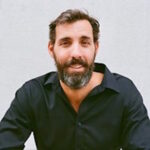
In November 2022, during CCARE’s Cultivating a Compassionate Heart course, I first encountered the term Common Humanity. I had always sensed its power and importance but couldn’t articulate it—until that moment. It was life changing.
The phrase itself had a natural resonance—its tone, flow, and imagery caught my attention. I knew it was significant. Today, more than ever, I see the urgent need to acknowledge and cultivate our awareness of Common Humanity. That realization has shaped my mission: helping men awaken to their fullest potential and overcome the barriers that hold them back.
In 2020, my co-host, retired Navy SEAL Jon Macaskill, and I launched the Men Talking Mindfulness podcast to help men embrace mindfulness and a holistic way of living. Through our research, I uncovered a key challenge many men face: recognizing the need for help, asking for it, and accepting it. It may sound simple, even obvious, but for many men, the fear of appearing “weak” is deeply ingrained. While this doesn’t apply to every man, it’s a common reality.
Rather than getting caught up in why this perception of “weakness” exists, we can shift our focus to the nurturing and prosocial aspects of Common Humanity—exploring what we can do to reshape our understanding of vulnerability and its impact on our lives.
By definition, Common Humanity emphasizes our shared struggles, imperfections, and interconnectedness. It fosters belonging and compassion over loneliness and isolation. This interconnectedness is a gift.
Think about it—without each other, we can’t truly thrive or even know who we are.
I witnessed this firsthand while designing and leading The Better Men Project, an experiential workshop for men as part of my Applied Compassion Training (ACT) Capstone project in 2023. I gathered 15 men in a New York City yoga studio, where we began with physical movement, breathwork, and deep reflection.
Anger became our shared focal point. Many men struggle with anger yet avoid discussing it. I introduced the topic, addressed common misconceptions, and asked each man to explore his personal experience with anger—where it manifests, how it affects his life, and its consequences. They wrote, reflected, and finally faced each other—eye to eye—to share their insights.
The tension in the room was palpable. Many men are hesitant, even fearful of discussing their emotions—especially anger, which often carries shame. But as they opened up, something remarkable happened.
The magic of Common Humanity emerged.
The results exceeded my expectations. These men, through shared vulnerability, gained powerful insights into their relationship with anger. More importantly, they realized they weren’t alone. That realization—that we are not alone in our suffering—is deeply healing. It’s where transformation begins.
In today’s tech-driven world, it’s easy to lose sight of our Common Humanity. Social media algorithms push us into echo chambers, fostering isolation rather than connection. What will another decade of endless scrolling do to society? I don’t want to find out.
In my experience, nothing replaces face-to-face interactions. Virtual groups can be impactful, but real, in-person connection remains unmatched.
As ambassadors of compassion, as leaders and students of this work, I challenge you: How can you awaken Common Humanity in your communities? How can you help lift people out of isolation?
It doesn’t have to be a grand gesture. It can be as simple as gathering old friends or creating meaningful conversations. The key is intention—and action.
Be bold. Take the leap. You just might change someone’s life.
